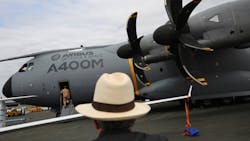Airbus Will Continue A400M Test Flights After Spanish Crash
MADRID, Spain — Airbus said it will carry on with test flights of its A400M military transport plane despite a crash in Spain of one of the aircraft that killed four employees who were honored Monday with a moment of silence at the company's factories.
The European aerospace giant has also decided to keep producing the model in the wake of Saturday's crash, the first involving a A400M plane, a company spokesman said.
The next test flight is scheduled to take place on Tuesday in Toulouse in southern France where Airbus' headquarters are located. All planes undergo a series of test flights before they are delivered to customers.
The A400M plane that crashed in a field and burst into flames just north of Seville's airport after hitting a power line was on a test flight before it was due to be delivered to Turkey in July.
Three passersby helped emergency services workers pull two of the plane's six crew members alive from the wreckage. Those crew members, an engineer and a mechanic, are in the hospital and in serious condition.
Spanish authorities on Sunday located the two cockpit recorders and handed them over to the judge investigating the cause of the accident.
Engine failure, or something else?
The online edition of German newsweekly Der Spiegel said the accident might have been due to engine failure.
"It appears that just after takeoff, several engines of the aircraft had problems," the magazine reported citing testimony of the two survivors of the accident. The survivor, who was seriously injured, has so far only been questioned about the crash "very briefly.”
Difficulties in the development of the plane's giant turboprop engines was one of the causes of the sustained delays in building A400M aircraft since the decision to build the model was taken in 2003.
In addition to production and delivery delays, the program ran 30 percent over budget, about 6.2 billion euros ($7 billion).
Earlier Monday, Malaysia became the latest country to ground its only A400M while it waits for the causes of the accident to become clearer, following similar decisions by Britain, Germany and Turkey.
France, which has six of the planes, has said it would only carry out "top priority flights" with the A400M until more facts emerge on what caused the accident.
Workers at Airbus's eight factories in Spain put down their tools at noon to observe five minutes of silence in memory of the four people who died in the crash.
Those at the company's factories in other nations were due to observe one minute of silence, said Antonio Martin, the Airbus delegate at Spain's largest workers' union Comisiones Obreras (CCOO). Martin refused to speculate on the causes of the accident and its possible impact on the A400M program.
"The priority is the mourning and looking after the families of the victims," he said.
Airbus CEO Tom Enders and Bernhard Gerwert, the head of the company’s defense division, traveled to Seville on Sunday to show their solidarity with the families of the crash victims, an Airbus spokesman said.
There will be no 'hasty conclusions' among continued tests
Spanish Defense Minister Pedro Morenes said Sunday it was "extremely important to not reach hasty conclusions" about the accident.
Airbus "represents the European military industry, we therefore must show our clear support for efforts to clarify this incident," he said during a meeting in France with his German, French and Polish counterparts.
Airbus maintains its goal of delivering 14 A400M planes this year. Twenty A400M planes are currently being assembled. The A400M military plane was developed for Spain and six other European NATO nations: Belgium, Britain, France, Germany, Luxembourg and Turkey. A total of 174 A400M planes have been ordered by the seven NATO nations, as well as Malaysia.
Airbus hoped to find a new client for the plane this year, but the accident threatens to derail this goal.
By Patrick Rahir
Copyright Agence France-Presse, 2015
About the Author
Agence France-Presse
Copyright Agence France-Presse, 2002-2025. AFP text, photos, graphics and logos shall not be reproduced, published, broadcast, rewritten for broadcast or publication or redistributed directly or indirectly in any medium. AFP shall not be held liable for any delays, inaccuracies, errors or omissions in any AFP content, or for any actions taken in consequence.
